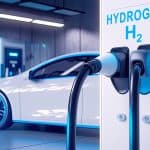Electric bikes, or e-bikes, have transformed the way we think about commuting and recreational cycling. Central to this revolution is the concept of torque, specifically the impressive 85 Newton meters (Nm) found in some of the most powerful e-bikes available today.
Torque is essentially the rotational force that powers an e-bike forward. The higher the torque, the better the bike performs in terms of acceleration and its ability to handle challenging terrains, such as steep hills or rough surfaces. An 85Nm torque rating places an e-bike among the elite in terms of power and performance, rivaling the capability of traditional motorcycles in certain scenarios.
The Bosch Performance Line CX motor, for instance, is a popular choice among e-bike enthusiasts and boasts an industry-leading 85Nm torque. This motor is designed to provide seamless assistance and extraordinary power delivery, creating an experience that closely mimics natural cycling yet with the added benefit of a significant power boost.
For those who enjoy off-road biking or live in hilly regions, an e-bike with 85Nm torque can make all the difference. It allows riders to tackle steep ascents with ease and maintain a consistent speed, regardless of the challenges. Moreover, this increased power does not necessarily equate to a loss in battery life, thanks to innovations in energy efficiency and smart control systems.
Whether you’re a seasoned cyclist or a commuter looking to beat the traffic, understanding the significance of torque can help you choose the right e-bike that suits your needs and maximizes the potential of your cycling adventures.
The Surprising Effects of E-Bike Torque on Urban Life and Beyond
Electric bikes, or e-bikes, with high torque are not just a game-changer for performance enthusiasts; they are reshaping urban commutes and the lifestyle of entire communities. While the powerhouse of 85Nm torque is celebrated among adrenaline seekers, its broader influence extends to diverse demographics, including city dwellers and environmental advocates.
How does high torque benefit daily urban life? In bustling cities where traffic congestion is a perpetual issue, e-bikes offer a viable solution. A robust torque facilitates a swift start from traffic lights and smooth navigation through tight city streets, making commuting faster and more efficient. This newfound agility and speed mean less time spent in gridlock and more predictable travel times.
Environmental Impact: Unlike traditional vehicles, e-bikes produce zero emissions, offering a sustainable alternative to gas-powered transportation. With reduced traffic congestion, cities experience a decrease in noise pollution and a lower carbon footprint. This shift not only benefits air quality but also enhances the quality of life for residents.
But, is there a downside to this technological revolution? Some critics argue that the ease of access and increased speeds could lead to more frequent accidents, particularly in urban areas where cycling infrastructure is inadequate. Thus, there is a growing call for improved bike paths and stricter regulation to ensure safety.
As e-bikes continue to dominate the commuting landscape, they inspire a revolution not only in how we travel but also in urban development and environmental policy. For more insights, visit Bosch, a leader in innovative e-bike motor technology.







